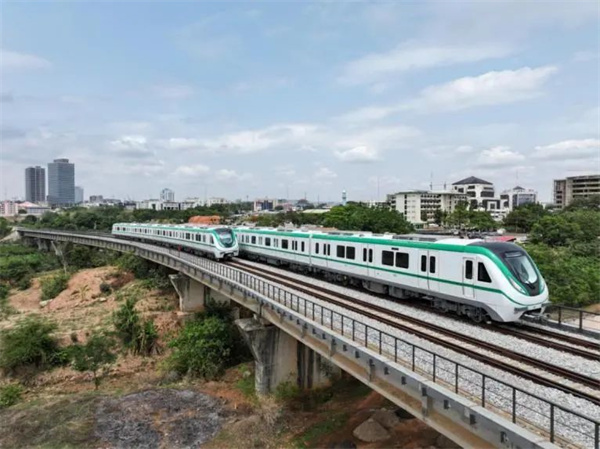The first phase of Abuja Light Rail, Nigeria's first light railway line, built by China Civil Engineering Construction Corporation (CCECC), a subsidiary of China Railway Construction Corporation Limited, was recently put into commercial operation.

Abuja Light Rail, Nigeria's first light railway line, is put into commercial operation. [Photo/sasac.gov.cn]
The Light Rail line is the first urban rail transit line in Nigeria's capital and a significant livelihood project under the Belt and Road Initiative in Africa. It spans 45 kilometers, connecting downtown Abuja, International Airport, satellite towns, and other parts of the city, covering 12 stations and one train depot.
The Light Rail line adopts the double-track standard track of the Chinese railway, with a maximum speed of 100 kilometers per hour. About 60 percent of the construction funds and 85 percent of the diesel multiple unit (DMU) procurement funds are financed by the Export-Import Bank of China.
The energy-saving trains are customized to cater for the local environment of high temperature, strong wind, and sand. The design fully considers the local shortage of electricity and meets practical, economical, and comfort needs. It will have a profound impact on the development of urban rail transit in West Africa in the future.

Local passengers test riding the train. [Photo/sasac.gov.cn]
After its commercial operation, the rail will greatly alleviate traffic congestion pressure in Abuja, save commuting costs, and drive local economic and social development.
Additionally, it will promote the construction of a multi-dimensional connectivity system in the capital, integrating railways, urban light rails, aviation and public transportation. This integration marks a crucial step forward in the development of Nigeria’s urban transportation.
The project has created nearly 10,000 jobs for the local community and cultivated more than 3,000 talents in the construction and operation of the line.
(Executive editor: Zhu Zeya)